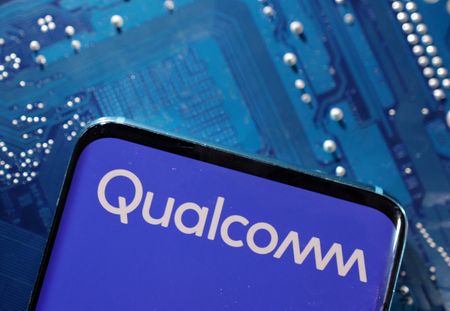(Reuters) – Qualcomm shares climbed about 10% to a more than two-year high on Thursday after the smartphone-focused chipmaker signaled an AI-fueled rebound in demand, especially in China, following a years-long slump.
Sales to Chinese smartphone makers jumped 40% in the first half of its fiscal year, the company said on Wednesday, as buyers there gravitate toward higher-priced devices that can accommodate AI chatbots.
“Chinese vendors who traditionally relied more on MediaTek, are going to start leveraging Qualcomm’s high-end chips more as they push hard into the AI Agenda,” said IDC analyst Nabila Popal.
“They further represent an upside for Qualcomm because majority of the recovery is also going to be driven by Chinese OEMs this year, coming from a tough last two years.”
Qualcomm on Wednesday projected third-quarter sales that were above estimates as it also benefits from its IoT (Internet of things) and auto segments.
The company, the biggest supplier of smartphone chips, was on course to add more than $18 billion to its market value if the gains hold during the session.
The Philadelphia Semiconductor index rose 1.4%, following a 3.5% drop on Wednesday on dour results from chip firms Advanced Micro Devices and Super Micro Computer.
According to preliminary data from research firm IDC, in the high-end segment, the AI buzz and the foldable products allowed the Android smartphone vendors to further differentiate themselves from Apple and garnered increased interest from Chinese consumers in the first quarter of 2024.
“We’re optimistic that numbers can be driven higher, given last year’s muted Android cycle and the likelihood of IoT(internet of things) improvement as inventory normalizes,” analysts at Wolfe Research said.
At least 14 analysts raised their price targets on Qualcomm, according to LSEG data.
Qualcomm’s shares were up 9.7% at $180.31 in early trading, set to add to the 13.5% gain this year.
Shares of Apple, which is set to report earnings after market closes on Thursday, were up 1.2%.
(Reporting by Harshita Mary Varghese; Additional reporting by Arsheeya Bajwa; Editing by Sriraj Kalluvila)

